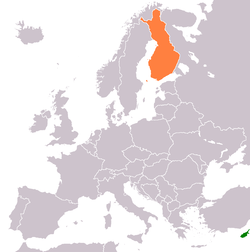
Cyprus is a member of the United Nations along with most of its agencies as well as the Commonwealth of Nations, World Bank, International Monetary Fund and Council of Europe. In addition, the country has signed the General Agreement on Tariffs and Trade (GATT) and the Multilateral Investment Guarantee Agency Agreement (MIGA). Cyprus has been a member of the European Union since 2004 and in the second half of 2012 it held the Presidency of the Council of the European Union.

The foreign relations of Finland are the responsibility of the president of Finland, who leads foreign policy in cooperation with the government. Implicitly the government is responsible for internal policy and decision making in the European Union. Within the government, preparative discussions are conducted in the government committee of foreign and security policy, which includes the Prime Minister and at least the Minister of Foreign Affairs and the Minister of Defence, and at most four other ministers as necessary. The committee meets with the President as necessary. Laws concerning foreign relations are discussed in the parliamentary committee of foreign relations. The Ministry of Foreign Affairs implements the foreign policy.

Relations between Finland and Russia have been conducted over many centuries, from wars between Sweden and Russia in the early 18th century, to the planned and realized creation and annexation of the Grand Duchy of Finland during Napoleonic times in the early 19th century, to the dissolution of the personal union between Russia and Finland after the forced abdication of Russia's last czar in 1917, and subsequent birth of modern Finland. Finland had its own civil war with involvement by Soviet Russia, was later invaded by the USSR, and had its internal politics influenced by it. Relations since then have been both warm and cool, fluctuating with time.

Croatia and Turkey established diplomatic relations in 1992. Turkey recognized independent Croatia in 1991. Croatia has an embassy in Ankara and an consulate-general in Istanbul and an 2 honorary consulates in Antalya and İzmir. Turkey has an embassy in Zagreb. Both countries are full members of Council of Europe and of NATO. Croatia is an EU member and Turkey is an EU candidate. Croatia supports Turkey's accession negotiations to the EU, although negotiations have now been suspended.

Cyprus-Spain relations are the bilateral relations between Cyprus and Spain. The relations are defined mainly by the membership of both countries to the European Union, Council of Europe and Organization for Security and Co-operation in Europe, and the Union for the Mediterranean. Cyprus has an embassy in Madrid and consulates in Barcelona, Bilbao, Sevilla and Granada. Spain has an embassy in Nicosia.

Cyprus-Polish relations are foreign relations between Cyprus and Poland. Diplomatic relations between both countries were established during the 1960s. Cyprus has an embassy in Warsaw and 2 honorary consulates. Poland has an embassy in Nicosia and an honorary consulate general in Limassol. The two countries share membership of the EU and COE and OSCE. The two countries became members of the EU in 2004.
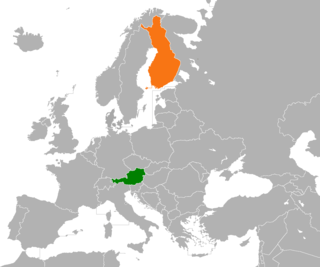
Foreign relations exist between Austria and Finland. Austria recognised Finland on 13 January 1918. Both countries established diplomatic relations on 19 July 1918. Austria has an embassy in Helsinki and 6 honorary consulates. Finland has an embassy in Vienna and 8 honorary consulates . Both countries are full members of the European Union and of the Council of Europe. The two countries became members of the European Union in 1995.

Finnish-Hungarian relations are the bilateral relations between Finland and Hungary. Both countries are members of the European Union, Council of Europe, NATO, and the Organization for Security and Co-operation in Europe. Both people’s language are part of the Finno-Ugric language family. In March 2023, Hungary fully approved Finland's application for NATO membership. There is minor tension in Finno-Hungarian relations at the advent of the Russo-Ukrainian and the Russo-Georgian wars, as Finland places themselves as staunchly against Russia in these conflicts, where as Hungary is far more neutral.
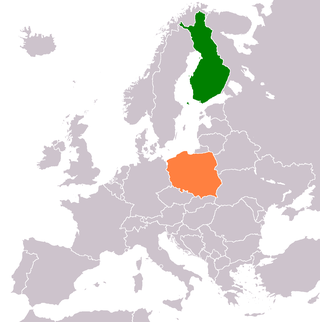
Finland–Poland relations refer to bilateral relations of Finland and Poland. Both countries are members of the European Union, NATO, OECD, OSCE, Council of the Baltic Sea States, HELCOM, Council of Europe and the World Trade Organization. Both countries established diplomatic relations on 8 March 1919. Finland strongly supported Poland's the European Union membership during the latter's accession process. Poland strongly supported Finland's NATO membership during the latter's accession process.
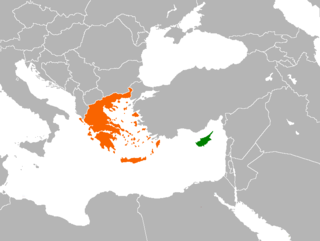
Cyprus–Greece relations are the bilateral relations between Cyprus and Greece. Cyprus has an embassy in Athens and a consulate-general in Thessaloniki. Greece has an embassy in Nicosia. Both countries are full members of the United Nations, European Union, Council of Europe and the Organization for Security and Co-operation in Europe (OSCE). Relations between the two countries have been exceptionally close since the Republic of Cyprus was formed in 1960. The Greek populations in Cyprus and Greece share a common ethnicity, heritage, language, and religion, leading to an exceptionally close relationship between the two countries. Greece has given full support to Cyprus's membership in the European Union.

Croatia–Sweden relations are foreign relations between Croatia and Sweden. Both countries established diplomatic relations on 29 January 1992. Croatia has an embassy in Stockholm. Sweden has an embassy in Zagreb and 2 honorary consulates.
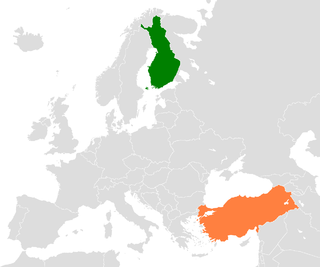
Finland–Turkey relations are foreign relations between Finland and Turkey. Finland has an embassy in Ankara and an honorary consulate general in Istanbul and other honorary consulates in Adana, Alanya, Antalya, Belek, Bodrum, İzmir, and Kayseri. Turkey has an embassy in Helsinki. Both countries are full members of the Council of Europe, the Organisation for Economic Co-operation and Development (OECD), the Organization for Security and Co-operation in Europe (OSCE), North Atlantic Treaty Organization (NATO), and the Union for the Mediterranean. Also Finland is an EU member and Turkey is an EU candidate. Turkey did not support Finland's accession to NATO until March 2023, but accepted its participation.

Finland–Germany relations are the bilateral relations between the Finland and Germany. Both countries are part of the European Union, are signatories of the Schengen Agreement, and are members of the eurozone and NATO. Germany supported Finland's NATO membership during Finland's accession into NATO, which was finalized on 4 April 2023.

Cyprus-Czech relations are foreign relations between Cyprus and the Czech Republic. Cyprus has an embassy in Prague. The Czech Republic has an embassy in Nicosia and two honorary consulates in Limassol and Nicosia. Both countries are full members of the European Union and the Council of Europe. The two countries joined the European Union in 2004.

Cyprus–Norway relations are foreign relations between Cyprus and Norway. Diplomatic relations were established on 22 March 1963. The government in Cyprus considers that the "bilateral relations between Cyprus and Norway are excellent in all fields". Neither country has resident ambassadors.
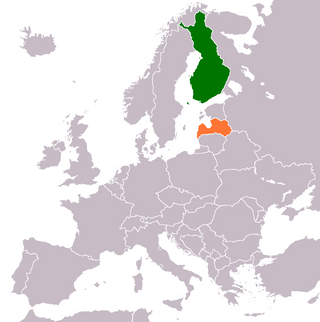
Finland–Latvia relations are foreign relations between Finland and Latvia. Finland has an embassy in Riga. Latvia has an embassy in Helsinki. Both countries are full members of the COE, CBSS, NB8, EU, NATO and Eurozone.

Foreign relations have reportedly always been strong between Armenia and Cyprus. Cyprus has been a supporter of Armenia in its struggle for the recognition of the Armenian genocide, economic stability and the resolution to the Nagorno-Karabakh conflict. In return Armenia has been advocating a stable Cyprus after the Turkish invasion in 1974 and supporting a lasting solution to the Cyprus dispute.

Cyprus–Germany relations are the bilateral relations between Cyprus and Germany. Germany is represented in Cyprus through its embassy in Nicosia, Cyprus. Cyprus is represented in Germany through its embassy in Berlin, Germany. Both countries are members of the European Union, Council of Europe and Organization for Security and Co-operation in Europe.

Cyprus–Mexico relations are the diplomatic relations between the Republic of Cyprus and the United Mexican States. Neither country has a resident ambassador. Both nations are members of the United Nations.

Portugal-Sweden relations are foreign relations between Portugal and Sweden. Portugal has an embassy in Stockholm. Sweden has an embassy in Lisbon and 3 honorary consulates. Both countries are full members of the United Nations, European Union, NATO, Organization for Security and Co-operation in Europe and Council of Europe. Portugal strongly supported Sweden's NATO membership during the latter's accession process.
